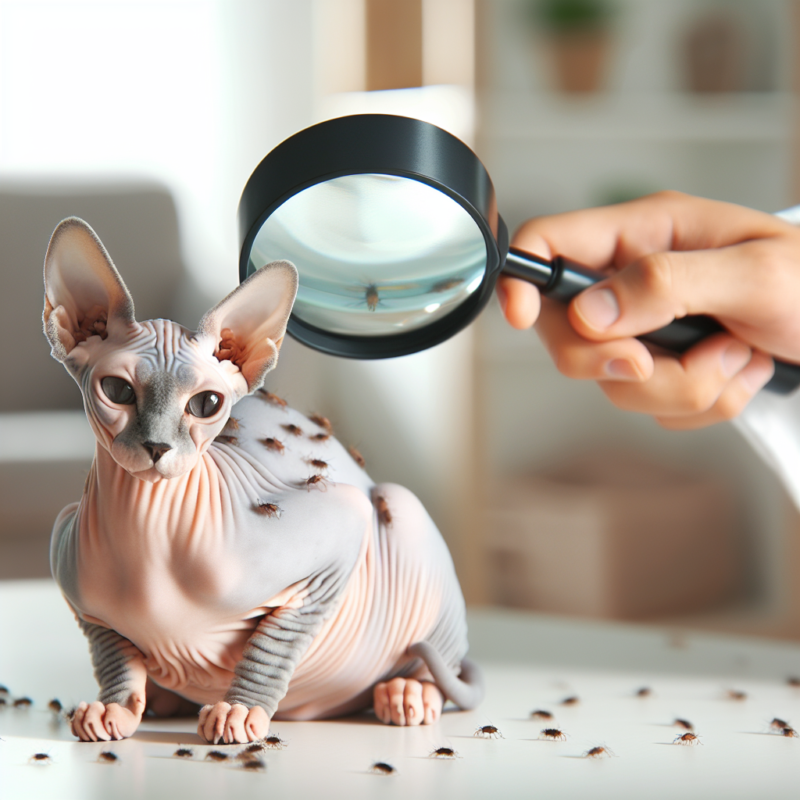Blog
can sphynx cats get fleas
Preventing Fleas on Sphynx Cats: Tips and Tricks

Sphynx cats are a unique and fascinating breed known for their hairless appearance and affectionate personalities. However, like all cats, they are susceptible to fleas. These tiny parasites can cause discomfort and health issues for your feline friend, so it’s important to take preventative measures to keep them at bay. In this article, we will discuss the question of whether sphynx cats can get fleas and provide tips and tricks for preventing fleas on your sphynx cat.
First and foremost, the answer is yes, sphynx cats can get fleas. Despite their lack of fur, fleas can still latch onto their skin and cause irritation. In fact, fleas are not picky about their hosts and will happily feed on any warm-blooded animal, including humans. This means that even if your sphynx cat is an indoor cat, they can still be at risk of getting fleas.
So, what can you do to prevent fleas on your sphynx cat? The first step is to regularly groom your cat. While sphynx cats may not have fur, they still have a thin layer of hair that can trap dirt and debris. Use a soft cloth or a gentle brush to wipe down your cat’s skin and remove any potential flea eggs or larvae. This will also help distribute their natural oils, which can act as a barrier against fleas.
Another important preventative measure is to keep your home clean and vacuum regularly. Fleas can lay eggs in carpets, furniture, and bedding, so it’s crucial to keep these areas clean to prevent an infestation. You can also use a flea spray or powder specifically designed for cats to treat these areas and kill any existing fleas or eggs.
In addition to grooming and cleaning, there are also preventative products that you can use on your sphynx cat. These include topical treatments, oral medications, and flea collars. Topical treatments are applied directly to your cat’s skin and can provide protection for up to a month. Oral medications are given to your cat in the form of a pill or chewable and can also provide long-term protection. Flea collars are worn around your cat’s neck and release chemicals that repel fleas. It’s essential to consult with your veterinarian before using any of these products to ensure they are safe for your sphynx cat.
If you have other pets in your home, it’s crucial to treat them for fleas as well. Even if they are not showing any signs of fleas, they can still carry them and potentially pass them onto your sphynx cat. Consult with your veterinarian to determine the best flea prevention plan for all of your pets.
In addition to these preventative measures, it’s also essential to be aware of the signs of a flea infestation. These include excessive scratching, red and irritated skin, and the presence of small black dots (flea feces) on your cat’s skin. If you notice any of these signs, it’s crucial to take action immediately to prevent the infestation from getting worse.
In conclusion, while sphynx cats may not have fur, they are still at risk of getting fleas. It’s important to regularly groom and clean your cat, use preventative products, and be aware of the signs of a flea infestation. By taking these preventative measures, you can ensure that your sphynx cat stays happy and healthy without the annoyance of fleas. Remember to consult with your veterinarian for the best flea prevention plan for your sphynx cat and other pets in your home. With proper care and attention, you can keep your sphynx cat flea-free and thriving.
Treating Fleas on Sphynx Cats: What You Need to Know
Sphynx cats are a unique and fascinating breed known for their hairless appearance and affectionate personalities. However, like all cats, they are susceptible to fleas. These tiny parasites can cause discomfort and health issues for your feline friend, so it’s important to know how to treat and prevent them. In this article, we will discuss the topic of fleas on Sphynx cats and provide you with the necessary information to keep your cat flea-free.
Firstly, it’s important to understand that Sphynx cats are not immune to fleas just because they don’t have fur. Fleas can still latch onto their skin and cause irritation and itching. In fact, because Sphynx cats lack a protective layer of fur, they may be more vulnerable to flea infestations. This is because fleas prefer to hide and lay their eggs in warm and dark places, and the folds of a Sphynx cat’s skin provide the perfect environment for them to thrive.
So, can Sphynx cats get fleas? The answer is yes. However, the good news is that fleas are easily preventable and treatable. The first step in preventing fleas on your Sphynx cat is to keep them indoors. This will significantly reduce their exposure to fleas and other parasites. Additionally, regularly grooming your cat can help you spot any signs of fleas early on. While Sphynx cats don’t require brushing, you can still use a damp cloth to wipe their skin and check for any signs of fleas.
If you do notice your Sphynx cat scratching excessively or see tiny black dots on their skin, it’s important to take action immediately. These black dots are flea dirt, which is essentially flea feces. You can confirm the presence of fleas by using a flea comb to comb through your cat’s fur. If you see any fleas or flea dirt on the comb, it’s time to start treatment.
There are several options for treating fleas on Sphynx cats. The most common and effective method is using a flea medication specifically designed for cats. These medications come in various forms, such as topical treatments, oral medications, and collars. It’s important to consult with your veterinarian to determine the best option for your cat based on their age, weight, and overall health.
In addition to medication, it’s crucial to treat your home and environment to prevent a re-infestation. Fleas can lay eggs in carpets, furniture, and bedding, so it’s essential to vacuum and wash these areas regularly. You may also want to consider using a flea spray or fogger to eliminate any remaining fleas and their eggs.
Prevention is always better than treatment when it comes to fleas. As mentioned earlier, keeping your Sphynx cat indoors is the best way to prevent fleas. However, if your cat does go outside, make sure to check them for fleas and use a flea preventative medication. You can also try using natural remedies, such as essential oils or diatomaceous earth, to repel fleas. However, it’s important to do thorough research and consult with your veterinarian before using any natural remedies on your cat.
In conclusion, Sphynx cats can indeed get fleas, but with proper prevention and treatment, you can keep your cat flea-free. Regular grooming, using flea medication, and treating your home are all essential steps in preventing and treating fleas on your Sphynx cat. Remember to consult with your veterinarian for the best course of action and always keep an eye out for any signs of fleas on your beloved feline friend. With proper care and attention, you can ensure that your Sphynx cat stays happy and healthy, free from pesky fleas.

